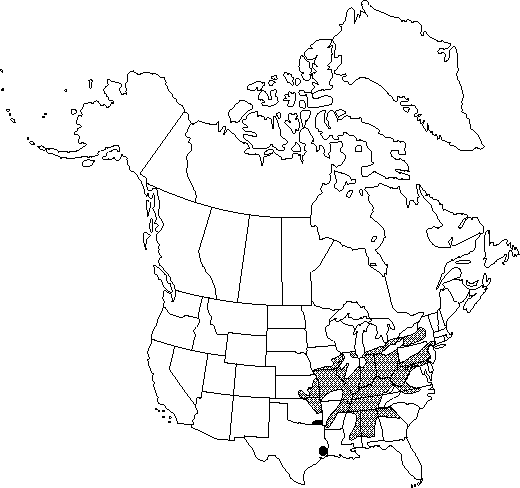Difference between revisions of "Carya laciniosa"
Hort. Brit., 384. 1830.
FNA>Volume Importer |
FNA>Volume Importer |
||
| Line 15: | Line 15: | ||
|name=Juglans laciniosa | |name=Juglans laciniosa | ||
|authority=F. Michaux | |authority=F. Michaux | ||
| + | |rank=species | ||
|publication_title=Hist. Arbr. Forest. | |publication_title=Hist. Arbr. Forest. | ||
|publication_place=1(2): 199, plate 8. 1810 | |publication_place=1(2): 199, plate 8. 1810 | ||
| Line 21: | Line 22: | ||
|name=Hicoria laciniosa | |name=Hicoria laciniosa | ||
|authority=(F. Michaux) Sargent | |authority=(F. Michaux) Sargent | ||
| + | |rank=species | ||
}} | }} | ||
|hierarchy=Juglandaceae;Carya;Carya laciniosa | |hierarchy=Juglandaceae;Carya;Carya laciniosa | ||
| Line 46: | Line 48: | ||
-->{{#Taxon: | -->{{#Taxon: | ||
name=Carya laciniosa | name=Carya laciniosa | ||
| − | |||
|authority=(F. Michaux) G. Don in J. C. Loudon | |authority=(F. Michaux) G. Don in J. C. Loudon | ||
|rank=species | |rank=species | ||
| Line 61: | Line 62: | ||
|publication year=1830 | |publication year=1830 | ||
|special status=Endemic | |special status=Endemic | ||
| − | |source xml=https://jpend@bitbucket.org/aafc-mbb/fna-data-curation.git/src/ | + | |source xml=https://jpend@bitbucket.org/aafc-mbb/fna-data-curation.git/src/f50eec43f223ca0e34566be0b046453a0960e173/coarse_grained_fna_xml/V3/V3_719.xml |
|genus=Carya | |genus=Carya | ||
|species=Carya laciniosa | |species=Carya laciniosa | ||
Revision as of 21:30, 16 December 2019
Trees, to 41 m. Bark light gray, fissured or exfoliating, separating freely into large, thick, broad plates that persist. Twigs orange-tan, stout, hirsute, scaly. Terminal buds tan, broadly ovoid with apices of outer scales prolonged, 12-20 mm, tomentose; bud scales imbricate; axillary buds protected by bracteoles fused into hood. Leaves 6-9 dm; petiole 6-13 cm, minutely hirsute, becoming glabrous at base. Leaflets (5-)7-9(-11), lateral petiolules 0-1 mm, terminal petiolules 2-14 mm; blades ovate to obovate or elliptic, not falcate, 9-20 × 3-10 cm, margins coarsely serrate, apex narrowly acuminate; surfaces abaxially hirsute with unicellular, 2-6-rayed fasciculate and occasionally multiradiate hairs, scaly with abundant large peltate scales and small round peltate scales, adaxially hirsute along midrib, puberulent throughout. Staminate catkins pedunculate, to 20 cm, stalks and bracts minutely hirsute, capitate-glandular; anthers hirsute. Fruits tan to brown, spheric to ellipsoid, not compressed or slightly so, 4.5-6 × 4-5 cm; husks minutely hirsute, 7-13 mm thick, dehiscing to base, sutures smooth; nuts tan, ellipsoid, compressed, 4-angled, rugulose; shells thick. Seeds sweet.
Phenology: Flowering spring.
Habitat: Rich bottomlands, along creeks, and in open cedar glades
Elevation: 20-300 m
Distribution

Ont., Ala., Ark., Del., Ga., Ill., Ind., Iowa, Kans., Ky., Md., Mich., Miss., Mo., N.Y., N.C., Ohio, Okla., Pa., Tenn., Tex., Va., W.Va.
Discussion
The most southern locality of Carya laciniosa is an outlier from Hardin County, Texas. Carya laciniosa hybridizes with C. illinoinensis (C. ×nussbaumeri Sargent) and C. ovata (C. ×dunbarii Sargent), and possibly C. cordiformis.
Cherokee Indians used Carya laciniosa medicinally as an analgesic, a gastrointestinal aid, and a general disease remedy (D. E. Moerman 1986).
Selected References
None.